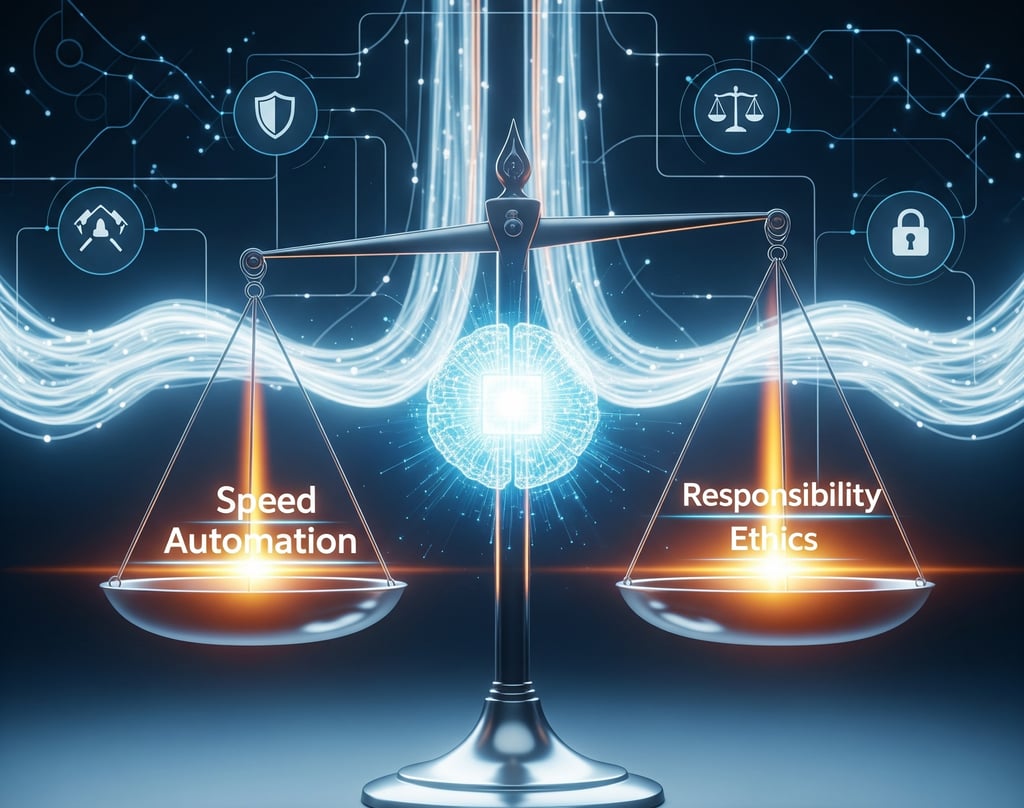The Ethics of AI in DevOps: Balancing Speed, Automation, and Responsibility
Artificial intelligence has revolutionized how we build, deploy, and scale systems. In DevOps, AI enables predictive monitoring, automated remediation, and lightning-fast deployments. But with such power comes responsibility: are we moving too fast without asking the hard ethical questions?
Voruganti Kiran Kumar
3/12/20242 min read


Artificial intelligence has revolutionized how we build, deploy, and scale systems. In DevOps, AI enables predictive monitoring, automated remediation, and lightning-fast deployments. But with such power comes responsibility: are we moving too fast without asking the hard ethical questions?
Why Ethics Matters in DevOps + AI
AI-driven DevOps (often called AIOps) promises:
Faster delivery cycles
Smarter root-cause analysis
Reduced human toil
But without ethical guardrails, we risk creating:
Opaque systems → AI makes decisions engineers can’t explain.
Unintended biases → ML-driven automation may prioritize convenience over fairness.
Security gaps → Over-reliance on AI may blind teams to subtle threats.
The DevOps ethos is automation + accountability. Ethics ensures accountability keeps pace with automation.
The Key Ethical Questions for AI in DevOps
Transparency:
Can engineers explain why the AI flagged one anomaly but ignored another?
Do stakeholders trust the outputs?
Bias:
Does the AI favor certain workloads, clouds, or vendors due to training data?
Are false negatives (missed issues) disproportionately risky for smaller systems?
Job Displacement:
Is AI meant to replace human operators—or free them for higher-value work?
What happens when critical skills atrophy due to over-reliance on automation?
Security:
If AI auto-remediates, could attackers exploit this behavior?
Who is liable if AI-triggered automation creates downtime?
Accountability:
When AI systems fail, who takes responsibility—the vendor, the engineer, or the organization?
Real-World Ethical Dilemmas
Incident Response Automation → AI kills a process during a suspected DDoS attack. But what if that process was serving life-saving healthcare data?
Cost Optimization Models → AI scales down underutilized servers to save money—but accidentally disrupts critical research workloads.
Bias in Monitoring → AI learns that “most outages” happen in certain regions and deprioritizes alerts there—exposing those users to disproportionate risk.
These are not hypothetical. They’re happening today.
Principles for Ethical AI in DevOps
Human-in-the-Loop by Default
AI suggests, humans approve—at least until trust is earned.
Phased automation ensures oversight before autonomy.
Explainability as a Requirement
Models must provide traceable reasoning.
“Black box” AI should never control mission-critical pipelines.
Bias Testing in Pipelines
Just as we run unit tests, we must run bias audits on AI outputs.
Shared Accountability
Organizations should define clear escalation and responsibility models.
Security-by-Design
AI tools must be hardened against adversarial inputs and model poisoning.
Building Trust with AI in DevOps
Ethics is not about slowing innovation—it’s about making innovation sustainable.
By embedding ethical frameworks:
Teams gain stakeholder trust → investors, regulators, and customers feel safer.
Engineers avoid “automation fatigue” → knowing the system is explainable and fair.
Organizations future-proof compliance → aligning with global regulations like EU AI Act.
The Road Ahead: Responsible Automation
Imagine a DevOps ecosystem where:
AI explains itself in plain English.
Bias dashboards are part of every CI/CD pipeline.
Ethical standards for AIOps are globally recognized, just like ISO or SOC certifications.
This is not just possible—it’s necessary. The companies that lead in ethical AI adoption will set the standards for the industry.
Final Thoughts
We are standing at a crossroads.
One path: automation at all costs, chasing speed and efficiency.
The other: responsible automation, where ethics, transparency, and accountability are built in.
As engineers and leaders, our role is clear: to ensure AI in DevOps enhances humanity, not replaces it.
The future of DevOps is not just fast—it must also be fair.
Call to the Community
Do you believe AI should always have a human-in-the-loop in DevOps?
How should accountability be defined when AI-driven automation fails?
I’d love to hear your perspectives—because the future of DevOps ethics is one we all share responsibility for.